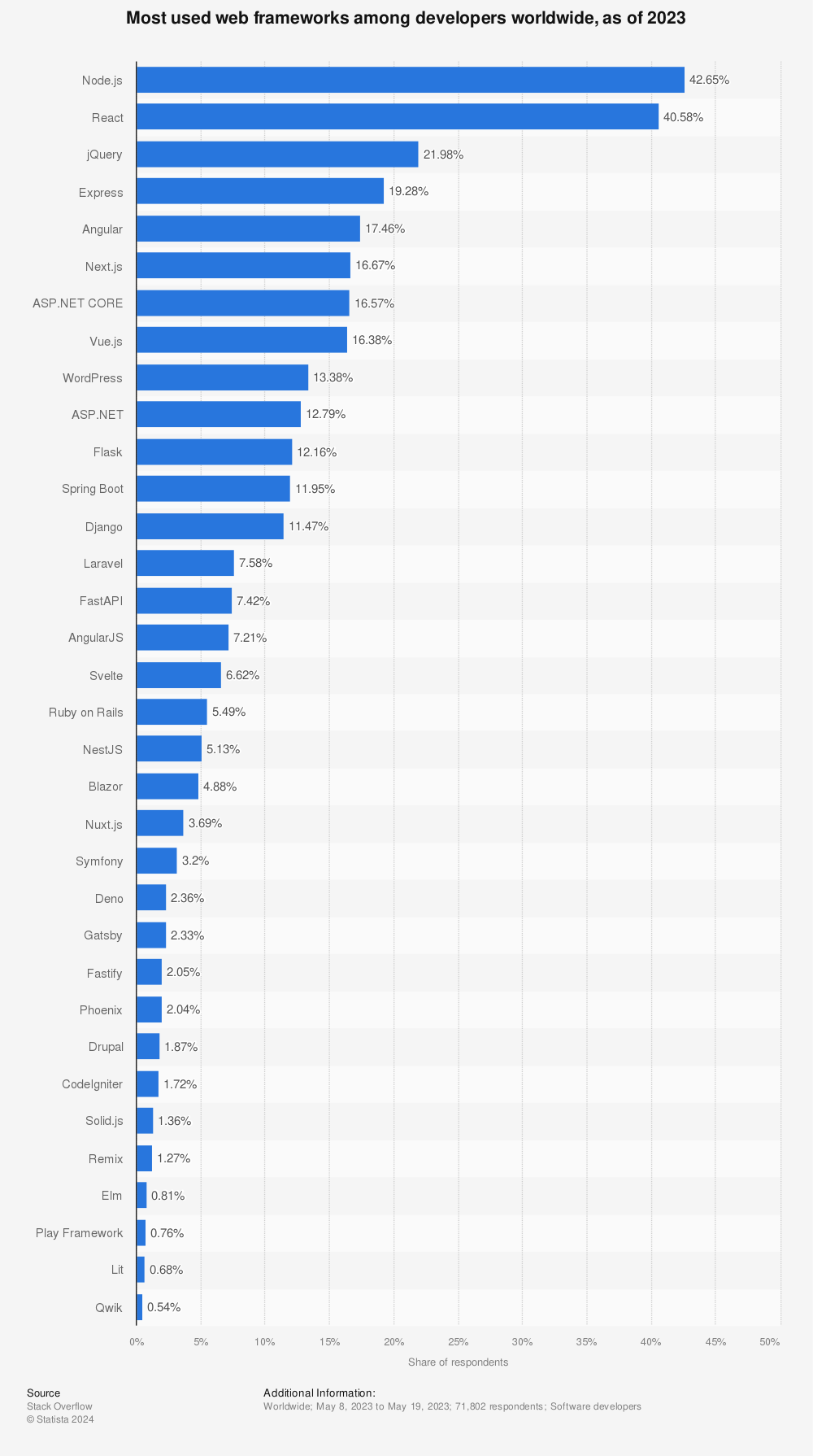Is AngularJS dead or merely transitioning? Dive into our exploration of AngularJS’s journey in the dynamic landscape of web development.

People once spoke about AngularJS with glowing admiration, touting its ingenuity. A product from Google’s repertoire, this tool had the strength to simplify web development. Back in 2010, it surged to prominence, sweeping developers off their feet with its two-way data binding and dependency injection.
Fast forward to 2023, a question rattles our collective consciousness – Is AngularJS dead? As a JavaScript veteran, I have lived through the highs and lows of its journey. Let’s meander through the timeline, analyzing how we reached here.
The Sparkling Debut
Around 2010, AngularJS entered the scene, causing an upheaval. Web developers cheered on, witnessing the dawn of a new era. To understand its profound impact, remember the pre-2010 era when JQuery held the reins.
Picture developers toiling over lines of code, wrestling to maintain synchronization between the model and the view.
In came AngularJS, akin to a knight in shining armor. Its two-way data binding feature worked magic, automatically updating the view when the model changed and vice versa.
Key Takeaway
Two-way data binding turned heads, sparking the initial success of AngularJS.
Pro Tip
Understanding two-way data binding opens up a world of seamless web development.
Slight Turbulence
With the advent of the 2010s, developers embraced AngularJS. A report from Stack Overflow in 2013 showed a 100% increase in AngularJS usage. But an undercurrent of dissatisfaction slowly built. Developers found the framework to be heavy, affecting the application’s performance.
Critics started questioning – Is AngularJS dying? Nonetheless, Google stayed committed to its brainchild and, in 2016, announced the release of Angular 2+. A complete rewrite of the original, Angular 2+ aimed to address its predecessor’s flaws.
Key Takeaway
Despite its popularity, AngularJS fell under scrutiny for its performance issues.
Pro Tip
When working with AngularJS, pay attention to its impact on application performance.
Angular 2+ Era
The arrival of Angular 2+ sparked a new chapter in web development. It showed that Google wasn’t willing to sit back and watch as the questioning chorus of “Is AngularJS dead?” grew louder.
Instead, it worked on reinventing and delivering a leaner, more powerful framework, one that put the focus back on performance and mobile-oriented features.
In 2022, Statista revealed that around 20.39% of developers used Angular or AngularJS. So, while AngularJS faced criticism, the overall Angular framework still held a significant share in the market.
Key Takeaway
Angular 2+ arrived to combat the criticisms against AngularJS, signaling Google’s commitment to the platform.
Pro Tip
Embrace the evolution in the Angular ecosystem for a better web development experience.
Present Day
By 2023, Google stopped providing support for AngularJS. Like a star waning before the dawn, AngularJS slowly receded, making way for more sophisticated, leaner tools such as Angular 2+ and React. So, to answer the question – Is AngularJS dead? Technically, no.
The framework still exists and some applications continue to run on it. However, in terms of active development and support, AngularJS certainly doesn’t hold the same position it once did.
Key Takeaway
While AngularJS isn’t “dead” in the literal sense, its usage has declined significantly due to lack of support and the rise of better alternatives.
Pro Tip
Migrate from AngularJS to Angular 2+ or other contemporary frameworks to stay in sync with the
evolving web development ecosystem.
A Deeper Dive into Angular’s Transition
Transitioning from AngularJS to Angular 2+ wasn’t an easy walk in the park. Truth be told, AngularJS and Angular 2+ seem like two different beasts. For developers acclimatized to AngularJS, Angular 2+’s Type-based approach posed a challenge. However, Google offered a smooth transition path using ngUpgrade.
Key Takeaway
Transitioning from AngularJS to Angular 2+ required effort but ngUpgrade facilitated the process.
Pro Tip
Utilize ngUpgrade to help bridge the gap between AngularJS and Angular 2+ during a migration.
The Pros and Cons
Reflecting on the journey of AngularJS, one cannot dismiss its groundbreaking impact. It paved the way for a new generation of JavaScript frameworks. But let’s delve into the pros and cons to assess its trajectory.
Pros
- Two-way data binding simplified the synchronization process between model and view.
- Dependency injection reduced the amount of code and improved modularity and reusability.
- The backing of Google ensured constant updates and support, at least initially.
Cons
- Performance issues tainted its reputation.
- The steep learning curve deterred some developers.
- Transition to Angular 2+ caused distress due to the significant difference between the two versions.
Key Takeaway
Despite its drawbacks, AngularJS made a significant impact on web development, but transition to newer versions is advisable.
Pro Tip
Consider the pros and cons before choosing your JavaScript framework. Keep up with updates and community opinions for the best insights.
FAQs
What will replace AngularJS?
AngularJS has already been replaced by its newer version, Angular 2+, which overcomes many of AngularJS’s limitations. Other alternatives include React, developed by Facebook, and Vue.js, a progressive JavaScript framework.
Key Takeaway
Angular 2+, React, and Vue.js are robust alternatives to AngularJS.
Pro Tip
Consider your project’s specific needs when choosing a JavaScript framework to replace AngularJS.
Why AngularJS is Discontinued?
Google decided to discontinue AngularJS due to its performance limitations and the emergence of more advanced technologies. They instead focused their efforts on Angular 2+, which addresses the flaws of AngularJS and aligns more closely with modern development trends.
Key Takeaway
AngularJS was discontinued due to its performance issues and the arrival of more efficient technologies.
Pro Tip
Stay updated on technology changes to ensure your skills and applications don’t become outdated.
Is AngularJS Obsolete?
While AngularJS is not “dead” in the strictest sense, its use has declined significantly. With Google ceasing support and the introduction of more efficient frameworks, AngularJS can be considered obsolete for modern web development.
Key Takeaway
AngularJS, due to lack of support and better alternatives, can be seen as obsolete for current web development.
Pro Tip
To stay relevant, consider transitioning from AngularJS to more modern frameworks like Angular 2+, React, or Vue.js.
Is Angular still relevant in 2023?

Yes, Angular (referring to Angular 2+ and subsequent versions) remains a potent tool in the web development realm. Its emphasis on performance, mobile-oriented features, and the backing of Google keep it relevant in 2023.
Key Takeaway
Angular (2+ and beyond) continues to be a relevant choice for web development in 2023.
Pro Tip
Continuous learning is crucial in web development. Even if you have expertise in one tool, keeping abreast of others broadens your skill set.
Is AngularJS Dead?
AngularJS isn’t “dead” in the absolute sense. However, with Google ceasing support and the rise of more efficient frameworks, it’s usage has significantly decreased. So, while some applications still run on it, AngularJS doesn’t command the same popularity or support as it once did.
Key Takeaway
While AngularJS still exists, its usage and support have dwindled, making it less relevant in the current web development scenario.
Pro Tip
Keep pace with the evolving web development landscape and consider migrating to more modern, supported frameworks.
Is AngularJS Outdated?
Yes, one could argue that AngularJS is outdated. It revolutionized web development during its peak, but newer technologies have since emerged that address AngularJS’s performance issues and offer advanced features. Hence, in the context of modern web development practices, AngularJS can be considered outdated.
Key Takeaway
AngularJS, while a groundbreaking tool of its time, can be considered outdated in today’s fast-paced web development world.
Pro Tip
Regularly update your toolkit and skills to stay current and relevant in the field of web development.
Has Angular Started to Slowly Die?

While there has been a decline in AngularJS usage, Angular (referring to Angular 2+ and subsequent versions) continues to hold a significant place in the web development world. Google’s continued support, regular updates, and the platform’s robust capabilities ensure that Angular remains a strong contender among JavaScript frameworks.
Key Takeaway
While AngularJS has seen a decrease in popularity, the Angular framework, particularly Angular 2+ and beyond, continues to be a robust choice for web development.
Pro Tip
Stay updated with the latest versions and updates in your chosen JavaScript framework to maximize efficiency and performance.
Is AngularJS Dead Reddit?
Based on discussions on Reddit, it seems the general consensus is that AngularJS is no longer the go-to framework for web development, mainly due to lack of support from Google and the advent of more efficient technologies.
Key Takeaway
Reddit threads indicate a shift away from AngularJS in favor of more contemporary frameworks.
Pro Tip
Online developer communities like Reddit can offer valuable insights into trends in web development.
Is Angular 2 Dead?
No, Angular 2+ is alive and thriving. It overcomes many of AngularJS’s limitations and continues to receive support and updates from Google.
Key Takeaway
Angular 2+ remains a robust, evolving platform for web development.
Pro Tip
Keep up with updates in Angular 2+ to leverage its full potential.
Is Angular Dead 2023?
No, Angular (referring to Angular 2+ and subsequent versions) continues to be a relevant choice in the web development field in 2023.
Key Takeaway
Angular, especially Angular 2+ and beyond, remains relevant in the web development industry in 2023.
Pro Tip
Stay updated with the latest Angular versions for better performance and more features.
Is Angular Discontinued?
No, Angular is not discontinued. While Google discontinued AngularJS, they continue to support and update Angular 2+.
Key Takeaway
AngularJS has been discontinued, but Angular 2+ and subsequent versions continue to be actively supported and updated.
Pro Tip
Stay updated about the life cycle and support status of your chosen web development framework.
AngularJS Vs Angular
While AngularJS brought about a revolution in web development, it fell short in terms of performance. Angular (2+ and beyond), on the other hand, addresses these shortcomings, offering a performance-centric, mobile-friendly platform.
Key Takeaway
Angular (2+ and beyond) addresses many of the performance issues found in AngularJS, providing a more efficient web development platform.
Pro Tip
Understand the differences and evolution from AngularJS to Angular for better decisions when selecting a framework.
AngularJS News
In 2018, Google announced the end of Long Term Support (LTS) for AngularJS as of July 1, 2021. Since then, there have been no major updates or news about AngularJS.
Key Takeaway
With Google ending LTS for AngularJS in 2021, the framework hasn’t seen significant updates or news.
Pro Tip
Stay informed about major updates or news regarding your chosen frameworks to understand their current status and future.
Is Angular Dying Because of React?
Not necessarily. While React has gained immense popularity, Angular continues to hold a significant share in the market. They cater to different developer preferences and project requirements.
Key Takeaway
Despite React’s popularity, Angular continues to be a relevant choice for many developers and projects.
Pro Tip
Choosing between Angular and React should depend on project requirements and personal preference.
AngularJS End of Life
Google ended Long Term Support (LTS) for AngularJS as of July 1, 2021, marking the official end of life for the framework.
Key Takeaway
Google’s ending of LTS for AngularJS in 2021 marked its official end of life.
Pro Tip
For active support and updates, consider transitioning from AngularJS to Angular 2+ or other actively maintained frameworks.
Conclusion
Reflecting on the journey, it’s clear to see why AngularJS held a place of reverence in the hearts of many developers. Despite its eventual decline, it reshaped the world of web development. Today, the echoes of “Is AngularJS dead?” resound.
While one could say AngularJS is in a state of dormancy, its spirit lives on in Angular 2+ and other subsequent versions. As we navigate the labyrinth of evolving technologies, remember the magic of AngularJS and how it altered our perception of web development.
Key Takeaway
AngularJS, though not in active use or supported as it once was, has undeniably left a lasting impact on web development.
Pro Tip
Stay adaptable in the dynamic world of web development. What matters most isn’t the tool but how you leverage it to create engaging, efficient, and user-friendly web applications.
Nicole is a highly accomplished technical author specializing in scientific computer science. With a distinguished career as a developer and program manager at Accenture and Nike, she has showcased exceptional leadership skills and technical expertise in delivering successful projects.
For the past 22 years, Nicole’s unwavering interest has been in JavaScript web development. Since the early days of its release, she has immersed herself in the intricacies of the language, exploring its vast potential and harnessing its capabilities to create dynamic and interactive web solutions. Nicole’s expertise in JavaScript extends to various frameworks and libraries, positioning her as a trusted authority in the field.
As a technical author, Nicole remains committed to staying at the forefront of emerging technologies and driving innovation in scientific computer science. Her expertise in JavaScript web development, coupled with her experience as a developer and program manager, positions her as a valuable resource for professionals seeking guidance and best practices. With each publication, Nicole strives to empower readers, inspire creativity, and push the boundaries of scientific computer science.








